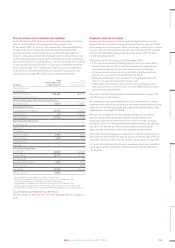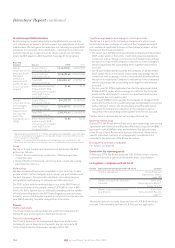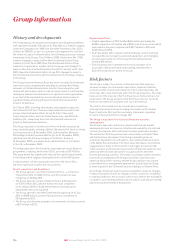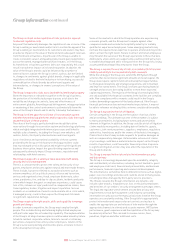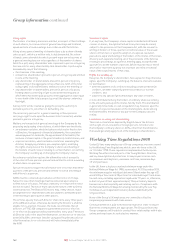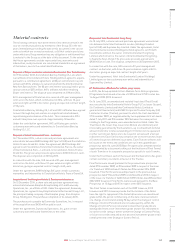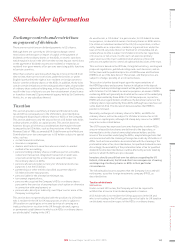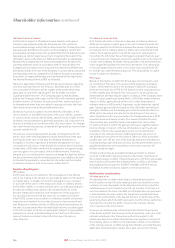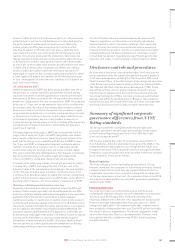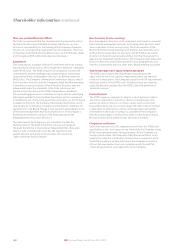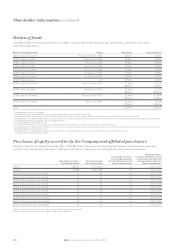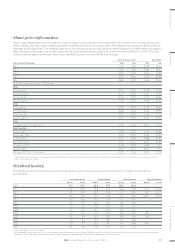Holiday Inn 2015 Annual Report Download - page 163
Download and view the complete annual report
Please find page 163 of the 2015 Holiday Inn annual report below. You can navigate through the pages in the report by either clicking on the pages listed below, or by using the keyword search tool below to find specific information within the annual report.
Articles of Association
The Company’s Articles of Association (the Articles) were adopted
at the AGM held on 28 May 2010 and are available on the Company’s
website at www.ihgplc.com/investors under corporate governance.
The following summarises material rights of holders of the Company’s
ordinary shares under the material provisions of the Articles and
English law. This summary is qualified in its entirety by reference
to the Companies Act and the Articles.
The Company’s shares may be held in certificated or uncertificated
form. No holder of the Company’s shares will be required to make
additional contributions of capital in respect of the Company’s shares
in the future.
In the following description, a ‘shareholder’ is the person registered in
the Company’s register of members as the holder of the relevant share.
Principal objects
The Company is incorporated under the name InterContinental Hotels
Group PLC and is registered in England and Wales with registered
number 5134420. The Articles do not restrict its objects or purposes.
Directors
Under the Articles, a Director may have an interest in certain matters
(Permitted Interest) without the prior approval of the Board provided
he has declared the nature and extent of such Permitted Interest at
a meeting of the Directors or in the manner set out in Section 184
or Section 185 of the Companies Act.
Any matter which does not comprise a Permitted Interest must
be authorised by the Board in accordance with the procedure and
requirements contained in the Articles, including the requirement that
a Director may not vote on a resolution to authorise a matter in which
he is interested, nor may he count in the quorum of the meeting at
which such business is transacted.
Further, a Director may not vote in respect of any proposal in which he,
or any person connected with him, has any material interest other than
by virtue of his interests in securities of, or otherwise in or through, the
Company, nor may he count in the quorum of the meeting at which such
business is transacted. This is subject to certain exceptions, including
in relation to proposals: (a) indemnifying him in respect of obligations
incurred on behalf of the Company; (b) indemnifying a third party in
respect of obligations of the Company for which the Director has
assumed responsibility under an indemnity or guarantee; (c) relating
to an offer of securities in which he will be interested as an underwriter;
(d) concerning another body corporate in which the Director is
beneficially interested in less than one per cent of the issued shares of
any class of shares of such a body corporate; (e) relating to an employee
benefit in which the Director will share equally with other employees;
and (f) relating to liability insurance that the Company is empowered
to purchase for the benefit of Directors of the Company in respect of
actions undertaken as Directors (or officers) of the Company.
The Directors have authority under the Articles to set their own
remuneration (provided certain criteria are met). While an agreement
to award remuneration to a Director is an arrangement with the
Company that comprises a Permitted Interest (and therefore does not
require authorisation by the Board in that respect), it is nevertheless
a matter that would be expected to give rise to a conflict of interest
between the Director concerned and the Company, and such conflict
must be authorised by a resolution of the Board. The Director that is
interested in such a matter may neither vote on the resolution to
authorise such conflict, nor count in the quorum of the meeting at
which it was passed. Furthermore, as noted above, the interested
Director is not permitted to vote in respect of any proposal in which he
has any material interest (except in respect of the limited exceptions
outlined above) nor may he count in the quorum of the meeting at
which such business is transacted.
As such, a Director has no power, in the absence of an independent
quorum, to vote on compensation to himself, but may vote on a
resolution (and may count in the quorum of the meeting at which
it was passed) to award compensation to Directors provided those
arrangements do not confer a benefit on him.
The Directors are empowered to exercise all the powers of the
Company to borrow money, subject to the limitation that the aggregate
amount of all monies borrowed by the Company and its subsidiaries
shall not exceed an amount equal to three times the Company’s share
capital and consolidated reserves, unless sanctioned by an ordinary
resolution of the Company.
Under the Articles, there are no age-limit requirements relating to
a person’s qualification to hold office as a Director of the Company.
Directors are not required to hold any shares of the Company by way
of qualification.
Rights attaching to shares
Dividend rights and rights to share in the Company’s profits
Under English law, dividends are payable on the Company’s ordinary
shares only out of profits available for distribution, as determined in
accordance with accounting principles generally accepted in the UK
and by the Companies Act. No dividend will bear interest as against
the Company.
Holders of the Company’s ordinary shares are entitled to receive such
dividends as may be declared by the shareholders in general meeting,
rateably according to the amounts paid up on such shares, provided that
the dividend cannot exceed the amount recommended by the Directors.
The Company’s Board of Directors may declare and pay to shareholders
such interim dividends as appear to them to be justified by the
Company’s financial position. If authorised by an ordinary resolution
of the shareholders, the Board of Directors may also direct payment of
a dividend in whole or in part by the distribution of specific assets (and
in particular of paid-up shares or debentures of any other company).
Any dividend unclaimed by a member (or by a person entitled by virtue
of transmission on death or bankruptcy or otherwise by operation of
law) after six years from the date the dividend was declared, or became
due for payment, will be forfeited and will revert to the Company.
STRATEGIC REPORT GOVERNANCE GROUP FINANCIAL STATEMENTS ADDITIONAL INFORMATIONPARENT COMPANY FINANCIAL STATEMENTS
161IHG Annual Report and Form 20-F 2015




